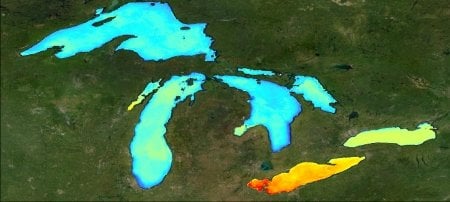Best case scenario. Worst case scenario. Sarah Green talks about the human impacts of climate change and responding to those changes on local and global scales.
Green, a professor in both the Department of Chemistry and the Great Lakes Research Center at Michigan Technological University, will present the Spring 2018 Distinguished Lecture at an upcoming session of the Michigan Tech Research Forum. Her lecture, "Expanding Spheres: Atoms to Earth, Local to Global, Science to Society," will take place this Thursday, February 15 in the Michigan Tech Memorial Union Ballroom at 4 p.m. All are welcome, including the general public.
The Michigan Tech Research Forum was started to showcase the work of Michigan Tech researchers and to strengthen interactions within our community, says Adrienne Minerick, assistant to the provost for faculty development. This internal University presentation series includes two networking events each semester: one Distinguished Lecture and one TechTalks session.
"Our previous recipients, Richelle Winkler, Simon Carn, and John Vucetich all crafted highly engaging lectures featuring the breadth of their published research, connecting it well with our region and our community," Minerick says. "We look forward to the insights shared by Sarah Green.”
Green joined the Department of Chemistry at Michigan Tech in 1994, serving as department chair from 2004 to 2013. She spent the next year at the US State Department as a Jefferson Science Fellow in the Bureau of East Asia-Pacific Affairs. She currently serves as co-chair for the Scientific Advisory Panel on the Sixth Global Environmental Outlook (GEO-6), United Nations Environment Programme. One of her regular collaborators, Mike Abbott, director of the Great Lakes Research Center Operations, nominated Green.
“Sarah has been part of several major climate-related/environmental monitoring efforts over the last 15 years," he says, "beginning with KITES, the very successful 2002 NSF-funded project that spawned nearly every other subsequent environmental monitoring effort in the upper Great Lakes. This work continues today with the Army Corps of Engineers, the Alliance for Coastal Technologies and NOAA's Great Lakes Observing System (GLOS).”
"We are linked to our environment by flows of atoms, and some of them are causing planet-wide changes. Chemical flows help visualize the big picture of climate change and the human impacts. The ultimate challenge in understanding how things work is to consider the whole Earth as a system of physical, biological and human processes."
Seven questions with Sarah Green
Q: You are an environmental chemist focused on global climate—including climate communication, science-policy interface and the response of aquatic systems to climate change. How did you come to choose this path? Or, did it choose you?
A: I have always wanted to understand how things work. My dad encouraged me to take things apart to figure them out. In college, I spent a few months replacing the engine in my car and saw how mechanical, electrical and chemical processes all join in a coherent system. Chemical reactions are themselves tiny systems that work when atoms and molecules line up in the right places with the right energies and electron arrangements to transform.
My graduate work focused on carbon-containing molecules in the ocean, which led me toward what is now known as earth system science. The ultimate challenge to understanding how things work is to consider the whole Earth as a system of physical, biological and human processes.
Q: What future opportunities exist with your research and communication efforts?
A: I really like collaborating with people from diverse fields because I always learn new perspectives on the world, new tools to understand it and new connections between its parts.
Q: What are the most important things you learned as a Jefferson Science Fellow and Scientific Advisory panel co-vicechair for the United Nations GEO6 Programme? Have these two experiences impacted and informed your research and teaching? Or vice-versa?
A: My work with the State Department and with United Nations Environment has given me direct experience at the science-policy interface. Perhaps the most important aspect of policy is listening carefully to identify the key concerns of all players. My work with policy has also exposed me to a few of the many smart and dedicated people who are striving to improve the world.
I have brought both experiences back to my teaching, especially in my Climate Science and Policy course.
Q: What do you consider to be most urgent problem to be solved in regard to climate change—and why?
A: Climate change is an enormously multifaceted problem. Many actions are urgent, so removing impediments to action may be the most critical starting point. Innumerable opportunities are emerging and many would flourish if obstacles were removed.
But the urgency of action on multiple fronts also means that people who are working on many different subjects are all contributing to climate solutions. People can contribute by working on myriad fronts, including new energy systems, cultural change, modern materials, ecology, art, hydrology, communication, transportation systems, philosophy, chemistry and especially cross-disciplinary exchanges.
Q: What is the best case scenario to slow or halt climate change effects?
A: We have the technology to drastically slow global warming. The best case scenario is that we collectively commit to deploying that technology, and that we skillfully manage potential economic and social disruption that can result from such large scale changes.
The faster we act, the better the chance of keeping global temperatures within tolerable limits.
Q: What is the worst case scenario?
A: The worst case scenarios are bad—and unpredictable. Humans have no experience with a climate warmer by 4 degrees Celsius than the one where civilization developed. Imagine taking the entire population of Earth to a new planet with unknown weather patterns, unknown ecology, new disease pathways and unpredictable crop yields.
Q: How does your work inform practice and policy, and within that context, what efforts are most impactful for the rest of us who are concerned about climate change effects?
A: I often feel like a translator between different branches of science: between science and engineering, between science and policy, between academics and other community members. It's hard to consider a systems view when you are focused on a specific problem. Incorporating other viewpoints helps people situate their work in a larger context.
To make progress on climate action, first we need to talk about it in our families, social networks and communities. Next, we need to be sure decision-makers know that we are judging their actions based on long-term climate impacts.
Michigan Technological University is an R1 public research university founded in 1885 in Houghton, and is home to nearly 7,500 students from more than 60 countries around the world. Consistently ranked among the best universities in the country for return on investment, Michigan's flagship technological university offers more than 185 undergraduate and graduate degree programs in science and technology, engineering, computing, forestry, business, health professions, humanities, mathematics, social sciences, and the arts. The rural campus is situated just miles from Lake Superior in Michigan's Upper Peninsula, offering year-round opportunities for outdoor adventure.






Comments